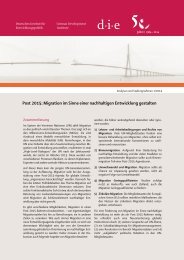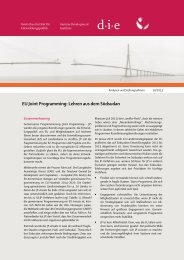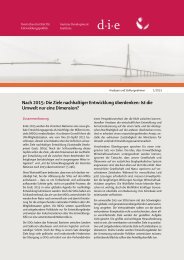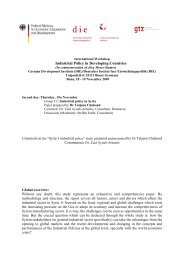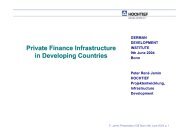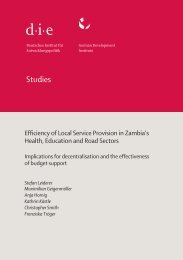Middle East / North Africa and the Millennium Development Goals ...
Middle East / North Africa and the Millennium Development Goals ...
Middle East / North Africa and the Millennium Development Goals ...
You also want an ePaper? Increase the reach of your titles
YUMPU automatically turns print PDFs into web optimized ePapers that Google loves.
120<br />
Markus Loewe<br />
ber of reasons can be responsible for <strong>the</strong> country’s insufficient progress: The<br />
success of any country in pursuing <strong>the</strong> MDGs depends on three kinds of factors.<br />
The first is <strong>the</strong> urgency to solve <strong>the</strong> existing problems of <strong>the</strong> country, i.e.<br />
<strong>the</strong> dimensions of <strong>the</strong> social problems depicted by <strong>the</strong> MDG indicators. It<br />
has already been noted in Chapter 3 that e.g. enrolment rates in primary<br />
education are much easier to raise by a few percentage points when <strong>the</strong>y<br />
have not exceeded levels of around 50 % than in <strong>the</strong> case that nearly every<br />
child is already enrolled in primary school.<br />
The second factor is <strong>the</strong> country’s capacities to solve its problems, i.e. <strong>the</strong><br />
ability of <strong>the</strong> relevant actors within <strong>the</strong> country to take adequate measures<br />
against <strong>the</strong>se problems. These capacities are determined by <strong>the</strong> availability<br />
of financial resources, but also by <strong>the</strong> know-how, <strong>the</strong> political creativity,<br />
<strong>and</strong> <strong>the</strong> administrative-organizational capacities of <strong>the</strong> relevant actors.<br />
The third factor finally is <strong>the</strong> country’s disposition or readiness to solve its<br />
problems, i.e. <strong>the</strong> will <strong>and</strong> resolve of <strong>the</strong> relevant political decision-makers<br />
to seek <strong>and</strong> find solutions <strong>and</strong> act (Lampert 1994, 145; Loewe 1999;<br />
Loewe 2000a, 7; Loewe 2004c, 394).<br />
This constellation of factors gives rise to an economic <strong>and</strong> a political dilemma.<br />
The economic dilemma is that countries which are characterized by a very<br />
high urgency to solve <strong>the</strong>ir problems are usually at <strong>the</strong> same time lacking <strong>the</strong><br />
capacities needed to solve <strong>the</strong>se problems. Most of <strong>the</strong>m are in an early phase<br />
of development where problems are still very severe but financial, administrative<br />
<strong>and</strong> organizational capacities to solve <strong>the</strong>m are also still limited.<br />
The political dilemma, on <strong>the</strong> o<strong>the</strong>r h<strong>and</strong>, is given when <strong>the</strong> main actors in a<br />
country have <strong>the</strong> capacities to solve existing problems, but are – for whatever<br />
reasons – not ready to do so – because, for example, <strong>the</strong>y prefer to spend government<br />
revenues for o<strong>the</strong>r purposes (e.g. to fill <strong>the</strong>ir own pockets).<br />
If <strong>the</strong> economic dilemma is noted for a developing country, <strong>the</strong>n <strong>the</strong>re is<br />
good reason to engage in DC with it. The main point of DC is to help developing<br />
countries to escape from just this economic dilemma: to support<br />
<strong>the</strong>m in precisely <strong>the</strong> areas in which <strong>the</strong>y are faced with very serious<br />
stumbling blocks to <strong>the</strong>ir development, bottlenecks that <strong>the</strong>y are virtually<br />
unable to overcome on <strong>the</strong>ir own.<br />
The case is a different one when a developing country is faced with <strong>the</strong> political<br />
dilemma, when, in o<strong>the</strong>r words, a developing country’s government<br />
German <strong>Development</strong> Institute



